In order to know how to deal with separation anxiety in dogs we first need to know what it is and what causes it.
It is surprising how many dogs actual suffer from separation anxiety. Research shows that between 10 – 14% of puppies and dogs suffer from separation anxiety.
What Is It?
Simply put separation anxiety is when your dog gets upset when you leave – he misses you. Well that doesn’t seem to be a major problem does it. In itself it isn’t. It becomes a problem when your dog or puppy display unwanted behaviour because of the anxiety.
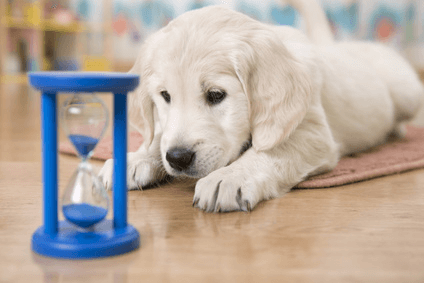
Unwanted Behaviour
Most dogs are perfectly well behaved when you are home with them but as soon as you leave bad things start to happen.
Dogs will chew things that they would never touch if you were home. Your dog is upset and is trying to calm himself so by chewing he is releasing an endorphin to help him stay calm.

Soon as you leave your house your normally quiet dog will start to bark and whine. This is your dog’s way of trying to communicate with you that it is time to come home – back to the pack.
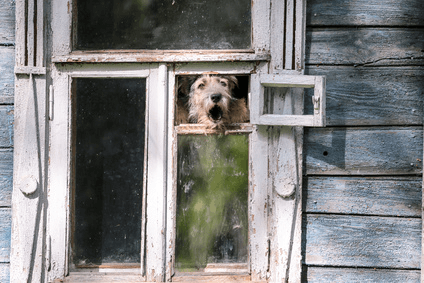
Some dogs have been known to go right through a window in an attempt to look for their owner. An escaped dog can often appear dangerous to anyone who comes in contact with him and also the dog running loose is himself in danger of many things, traffic being a big one. All he is really doing is looking for his owner.
Other behaviour that is associated with separation anxiety is digging, self mutilation such as excessive licking and chewing at themselves. Drooling excessively is also a stress related behaviour which can often be mistaken for a medical issue.
Another common behaviour that is an indication of separation anxiety is when your totally housebroken dog starts to mess in the house when you are away.
So we know what the symptoms of separation anxiety are and truthfully they are not behaviours that we want our dogs to be doing. In fact many dog owners, not knowing what is really going on, or unable to cope with the unwanted behaviour, will often surrender their dog to a shelter.
Causes of Separation Anxiety
No one can say specifically what causes separation anxiety in their dogs but because of certain circumstances conclusions as to why have been reached.
Since dogs from shelters seem to suffer more from separation anxiety than a dog that has been raised in one family from a puppy it is natural to assume that the anxiety is coming from the puppy losing an important person or persons in his life.
Other events such as the following, can also trigger separation anxiety:
- Change of family
- Change of schedule
- Moving
- Change in members of the house
Change of family may be the biggest trigger for symptoms of separation anxiety to arise. The dog may be surrendered to the shelter for whatever reason or the dog may just be given to another family.
Dogs like a routine, in fact most animals like a routine. The biggest routine change that would be upsetting to your dog is how long you are home with them. If for some reason you have not been working for a long time and now you start a job that takes you out of the house for 7 to 8 hours, this is a big adjustment for your dog. He may start to chew, bark and even mess in the house.
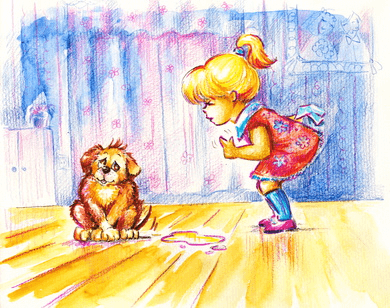
As I said earlier animals like a routine and they like to have things in the same place. Trying moving their water bowl and watch what happens. So if you decide to move then everything is different. Usually with time your dog will adjust to the change without too much trouble.
The last trigger that we will look at is similar to the first. Sometimes people in a family move away like kids going to college or sometimes someone in the family dies and this could be another pet. This can definitely trigger separation anxiety.
I remember when one of our dogs died the other dog wandered around for days with her tennis ball in his mouth. He was never allowed to have the tennis ball because he would tear them apart. He carried her ball around for days and never even put so much as a tooth mark on it.
So how do we help our dogs deal with separation anxiety?
When dealing with separation anxiety many dog owners end up just treating the symptoms. For example if your dog is chewing on stuff every time you go out then you start training him to chew on appropriate toys and make sure he has plenty of them when you go out. When you come home he has chewed on the toys and left everything else alone. Problem solved.
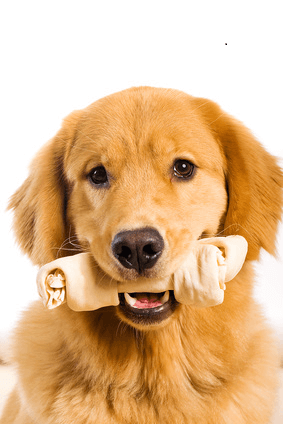
Not really, the symptom has been dealt with but the problem is still there – he is still suffering from the anxiety.
So in order to truly deal with your dog’s anxiety you need to treat the real problem. You need to take over your pack. Yes YOUR PACK!
All these symptoms that your dog is exhibiting is from a dog who thinks they are in charge. The leader of the pack can come and go as they please without the other pack members getting upset.
If the pack leader decides to go to a better hunting ground the rest follow without anyone complaining. The pack leader does what he wants and he looks after the pack.
By you taking your rightful position as leader your dog will be much more relaxed.
Now that you know what the true problem is it is time to learn how to be the pack leader and put an end to your dog’s anxiety.
The best place to learn how to become the pack leader is at the Online Dog Trainer. Doggy Dan runs a video based website where you can learn how to deal with separation anxiety in dogs by becoming the Pack Leader.
Don’t let your dog become the following statistic – “The single greatest cause of death in dogs under one year of age is not Parvo, it’s not Distemper, it is lack of obedience training and 93% of training and behaviour problems can be solved using a series of simple dog training techniques.”
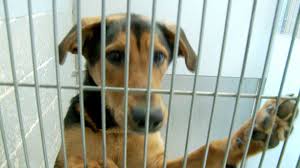
Share This:
Excellent post…and a thorough explanation of what separation anxiety is, why dogs experience it, and how to deal with it. Is it acceptable to crate a dog to keep him out of trouble, thus reducing stress for the owner? I came home once to a library book strewn throughout the house where the dog had destroyed it. Up until that time, I thought chewing was reserved for puppies. I was clearly wrong. Can a dog overcome this fear? Is there an age where he outgrows it?
If you can’t trust your dog when you go out you definitely need to crate him or have a room where you can put him in. We had a room for our two dobes and when we went out they were in their room, Chewing is not reserved for puppies. Puppies chew mainly because they are teething and adult dog chews to feel better, to relieve the stress of being left alone. Once you learn how to be the alpha this behaviour should stop.
I can totally relate to your post. I had a dog who was a rescue, She was the sweetest thing when we were home; she loved to play, be pet, and relax with us, She wasn’t aggressive over toys or food. However, when we left the house, she had terrible separation anxiety. She was a 40-pound dog who managed to fit through the baffle of a window AC unit. She also broke out of our laundry room window, and jumped a tall fence. She even broke some teeth escaping, It was heartbreaking, and we tried so many things to help her. None seemed to work. If/when I get a dog again, I will definitely look up the training you suggested.
Hi Kiki thanks for giving us some insight to your dog’s separation anxiety. Many dogs who are rescued suffer from separation anxiety. Think about it they have already been dumped at least once in their mind what’s stopping you from doing the same thing.
The dog we currently have is a rescue also. Some fella adopted her when she was around 3 -4 months old. He kept her for around 3 months and then brought her back. We were looking for a companion for our female dobe since our male had died and Olive seemed like a good fit.
The guy complained that she used the house as a toilet and she barked a lot. She had two accidents when we first got her and her barking has decreased a lot.
We were fortunate that we are both retired so we probably had a lot more time to spend with her than her previous owner. When we go out she has full run of the house. You can leave food on the floor and she won’t touch it. We were quite lucky that she turned out so well!
HI there!
was dealing with exact same problem with my yorkie, when started to work long hour he got to the point that he won’t be even exited anymore to see me when i get back home, he actually got depressed! there was nothing i could do much physically as i do need to work. eventually solved it by getting him a yorkie female friend i got her as a puppy and boy she was an active one and didn’t give to much time to relax. sins then both of the dogs more then happy to see me back even if i left only for 5 minutes. now after 4 years they madly in love with each other and cant be separated! good topic! it’s like mind reading! thank you!
Glad to hear your Yorkie is no longer depressed. When you have two dogs and if they get along they usually do become inseparable. It is so cute watching them together.
I found your website on Separation Anxiety in Dogs very well explained and one I could identify with. You give a thorough explanation of the problem and some causes.
There is certainly a lot in becoming the pack leader.
We had an English Staffy who was a perfect dog until you had to leave him at home. He would rip plants out of the garden and out of pots. I could have done with your advice back then!
Thank you for a well put together website and I wish you every success.
Thanks for your comments Carol. Being the pack leader is more of a day to day life style rather than training. By that I mean you need to be doing the same things every day with your dog for them to get it. For example the leader always goes out the door first. You let them ahead of you just once and you almost have to start all over. You need to be consistent.